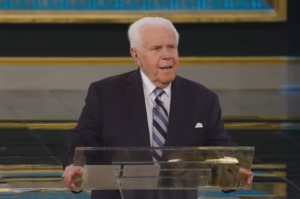Christian investors, what are BlackRock and other Wall Street giants supporting with your money?
The Wall Street Journal recently ran a news story about how Larry Fink, the CEO of the world's largest investment company, is pursuing his own social and political goals using client money.
BlackRock manages roughly ten trillion (yes, I meant to use the "t", that's trillion, not billion) dollars worth of investments. Even if you are not invested directly in a BlackRock fund, they may well be managing the retirement plan of your employer or of your state. They also administered the bonds involved with various stimulus programs (ones which they recommended the government launch) so if you are an American, they're managing a portion of the national debt.
One of the little secrets about these money management firms is that they don't just get to make money on your investments as a client (which, of course, is fine), but that they get to vote on your behalf about a wide variety of social and political corporate policies according to BlackRock's value system, and not yours.
Case in point, transgender issues:
"… the money manager joined others in signing a statement opposing a Texas bill regulating transgender access to public bathrooms in 2017, Britt Harris, then-investment chief at Teacher Retirement System of Texas wanted a word with Mr. Fink. Mr. Harris, who now leads the University of Texas/Texas A&M Investment Management Co., told Mr. Fink that he respected the CEO’s personal views. But he didn’t want BlackRock telling Texas what to do, according to people familiar with the men’s exchanges."
Wherever one stands on such issues as sexual reassignment medical procedures for minors, forcing physicians to violate their religious or moral convictions about such matters, or whether a biological man ought to be able to force himself onto a girl's wrestling team, it is at least clear that these issue are highly contentious and that that they are likely to foster backlash.
In fact, they already have:
"Mr. Fink’s power, combined with his advocacy on a hot-button issue, has made him a flashpoint for activists, politicians and unions, both those who think BlackRock isn’t doing enough and others who say it’s doing too much."
It's interesting to note that BlackRock is under pressure from activists who think it "isn't doing enough." Having attended dozens of annual meetings, I've noticed a pattern in which those companies which have a history of acquiescing to social activists find themselves subjected to escalating demands. The basic argument is usually something like "You've already made public statements saying that LGBTQ (or global warming, or voting rights, 'stakeholder capitalism', etc.) are core values, now you have to live up to that by doing x, y, z!'
In other words, appeasing these groups seems to lead to more demands.
But we also should not underestimate the degree to which consistently coming down on the side of one particular ideology is also stoking anger from the right, including people with real power:
"In mid-2021, two Republican senators wrote to a large 401(k)-type plan expressing concern BlackRock was putting its CEO’s views ahead of investors’ needs and infusing left-leaning priorities in its voting guidelines … Mr. Toomey is the ranking member of the U.S. Senate Banking Committee, which has a say over financial regulation matters. Mr. Johnson is the ranking member for the Senate Homeland Security and Governmental Affairs Committee’s Permanent Subcommittee on Investigations."
The issues go further than LGBTQ identity politics. For example, at the same time that BlackRock is promoting the LGBTQ political agenda as an humans rights issue, it is actively pursuing negotiations with China to launch investment funds within the country. While those negotiations have been going on, BlackRock recently said that investors have too little money invested in China.
Furthermore, BlackRock has aggressively fought against the use of fossil fuels by American companies (while China remains the largest emitter of carbon in the world), going so far as backing efforts by an activist hedge fund to put two members on the board of Exxon who are opposed to the use of fossil fuels such as oil. It's understandable for investors to ask precisely how it is in the interest of an oil company to be against the use of oil.
A concerning element of this focus on fossil fuels is the degree to which Mr. Fink has been calling on global institutions to use the 2008 model of government centralization, bailout and control on a global scale to promote 'sustainability':
"One idea he pushed was authorizing the World Bank and International Monetary Fund to shoulder the first losses on sustainable-energy projects, so other investors would feel safe putting in money. It was an echo of how the U.S. in 2008 fenced off the worst Bear Stearns holdings to encourage JPMorgan to take over the firm."
Larry Fink Wants to Save the World (and Make Money Doing It)
One need not be a conspiracy theorist (and I certainly am not) to recognize that the policy recommendations that Mr. Fink and/or BlackRock are making share a great deal of overlap with the publicly declared ideas which the founder of Davos branded The Great Reset: The Great Reset | World Economic Forum.
Of course, anyone is free to promote whatever ideology they wish. The problem is that BlackRock and other giant asset managers are doing it in your name and with your money. BlackRock is offering some large institutions such as retirement plans to vote their own shares, but that is not available to plain old 'retail investors.'
So, for ordinary investors, when you buy shares in their funds, you are buying them seats at the table. Your money is giving them votes in annual meetings. It's time for investors to start asking BlackRock and Vanguard and the other large asset managers, "What, exactly, have you been promoting with my money?"
Or as legendary gadfly investor, Sam Zell said on CNBC a few years back, “I didn’t know Larry Fink had been made God.”
Readers of this column know that he has not.
Jerry Bowyer is financial economist, president of Bowyer Research, and author of “The Maker Versus the Takers: What Jesus Really Said About Social Justice and Economics.”





























